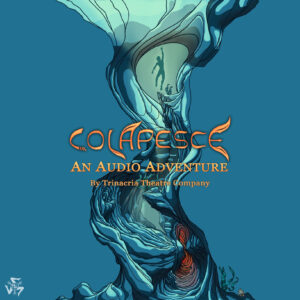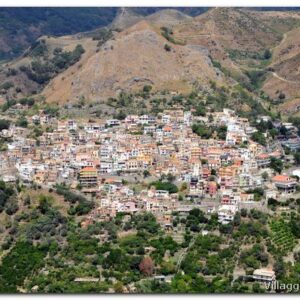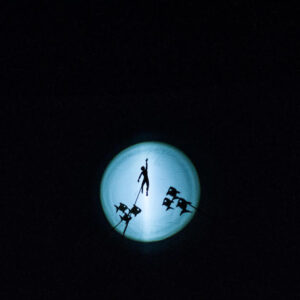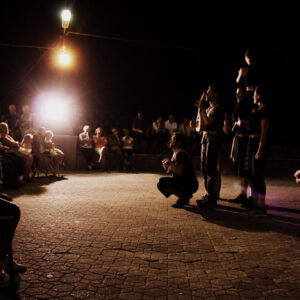It’s well known that to really know a different culture from your own, reading a book, watching a documentary or even speaking with people from that culture is not enough to to know and understand it; it’s a very good step but not enough. I was aware of this dynamic, but I’ve come to understand it profoundly in the last three years that I’ve spent here in the US after leaving Italy. Living the culture makes the difference.
So, if you are American, and I tell you that there’s a little village in Sicily, Italy, soaked in history and traditions, gorgeous landscapes and amazing food you might not really be able to visualize it as it really is. Nothing says more than a direct experience.
This is why I was curious to know more about the Trinacria Company. This is a theater company – and so far nothing special about it – but it’s an American company, based between Boston and London and with a very Italian name (Trinacria is is the three-legged woman’s head that symbolizes Sicily). Sometimes it’s easy to claim to be an Italian ‘business’ when you have Italian origins but, being 100% Italian, I can tell you that very often under the Italian cover there is no Italian book at all! Because of that, I approached the company website with a little skepticism but that was soon dispelled. What I learned is the great work that this small, and relatively new company, does to justify its Italian name. I’m happy to introduce it to you because I believe it’s worth it.

Please meet Mariagrazia La Fauci, born and raised in Boston by two Sicilian parents and founder of the Trinacria Company. Mariagrazia currently lives between Boston and London but grew up surrounded by the Italian language and spending all her summers in Pezzolo, the “village built on a rock” in the Peloritani mountains looking out onto the Strait of Messina. And apparently that is exactly what inspired her to start her theatre experience.
What really caught my attention about the company, more than the fact that it’s inspired by South Italy’s traditions and myths (so rich in stories to be told and therefore a perfect source for a theater company) is that it dives right into the direct experience that is so fundamental to really understand a culture. In fact, Mariagrazia organizes trips to the village of Pezzolo during which the company lives and works completely engrossed by the environment that they are relating; it is a full immersion experience that allows the actors to deeply understand the culture they’re representing.
Tell me about the company: when was it born and how and why?
“Trinacria was born in 2016 and is deeply inspired by the place where I have my roots. Pezzolo was first settled in the 9th or 10th century AD, and it’s a beautiful place. There was once a very active community, but slowly there’s been a decline in the number of people and businesses, a common phenomenon in rural parts of Southern Italy. I felt this place still had something to offer — anyone I’d ever brought to visit has loved Pezzolo for the beautiful landscape, welcoming people, rich history & mythology, and of course, the food. I find the entire Strait of Messina an incredibly inspiring place, where you feel close to the stories that first lit the ancient fire of human imagination. I was sure other artists would feel the same…turns out, I was right! Every artist who has ever come to the residency in Pezzolo has returned (some multiple times!) or expressed a strong interest in returning”.

Can you tell me more about this full immersion experience that you offer to your actors?
“We try to offer the residency every summer (but of course the program is sadly on hold until after COVID). This began in 2016 when we brought eight American theatre artists to Pezzolo to focus on developing our first production. During the residency, the artists live, eat, train, learn, travel, work, and create together. We also offer some Italian lessons, because many of the artists we work with don’t speak Italian! We rehearse with open doors and we often have folks wandering in. We want to make the community know the stories are theirs and invite them to be part of the retelling.
In that first year we were very focused on building and rehearsing the production, but as time has gone on, we wanted more opportunities for our artists and community to engage. So, we’ve expanded our work to include a series of participatory, community-focused Trinacria Arts Festival events that bring people together — from professional artists, to local talent, to members of the community. In 2020, we developed a new format which is the Open Creative Residency. We put out a call to artists from all over the world to come to Pezzolo to work on their own individual projects, specifically projects or artists where community engagement is an essential element of their work. We received an amazing response and have chosen four phenomenal professional artists from all over the globe — I’m so looking forward to bringing them to Pezzolo when the pandemic is over!”
Your current project is a very interesting one. Can you tell me what is it, what’s it about and how it started?
“The theatre branch of our organization is a devised, ensemble company. We work collectively to build a show without a script and our company members are not just actors but creators. We usually begin with a myth or legend as inspiration and then we build the story together using our shared creative faculties — music, movement, physical storytelling, poetry, acrobatics, clowning, puppetry, and more. Because we make shows for global audiences, we avoid language as much as possible and rely on imaginative physical storytelling. That said, even though we use experimental theatre techniques, we strive to create work that is narrative-driven and widely accessible.
Our performances in Sicily are always free and usually take place in various public spaces, often outdoors. We want to generate art in these familiar spaces not only so that our work feels inclusive to our communities, but also to activate the imagination and the possibilities in the spaces people already inhabit in their daily lives. Using these techniques, during the 2016 Residency, we created our first show, La Storia di Colapesce, a local Messina folk legend. Cola (short for Nicola) is a fisherman’s son who swims so much that people call him “Colapesce” (“Cola the Fish”).
In all the many versions of the tale, Cola eventually learns the island of Sicily is held up on three columns and the column beneath Messina at Capo Peloro is nearly ready to collapse. One day Cola dives into the sea and never returns. Some say he is still down there, taking the place of the column and holding Messina on his shoulders. The show has always been close to our hearts and we were hoping to put it back on tour in 2020, but of course, COVID prevented our plans.
However, a few members of the company wanted to keep it going and said, “What if we made an audio story of Colapesce?” And we figured this was actually the perfect moment to create a version of the tale people could enjoy from their homes. It was an enormous task translating this show (with very little language!) into audio, but it was well worth it — even though it’s so culturally specific to Sicily and Messina, it’s a powerful story that taps into the heart of some universal human truths. We had an amazing cast of seven actors and five musicians, and we recorded all the sound effects ourselves, so absolutely everything you hear in the audiobook was created by us. And we’re very proud of how high-quality the final product turned out, especially considering it was recorded in isolation.
Our audiobook director and editor, Quinton Kappel, had a huge challenge but he knocked it out of the park and we also had lots of help from our consultant Becky Parker Geist of Pro Audio Voices to bring it to a very professional level. Colapesce: An Audio Adventure is family-friendly so children and parents can listen together. It’s an mp3 download, it lasts 2 hours and 40 minutes, it’s mainly in English (with a little Italian and Sicilian sprinkled in), and the download costs $12”.

I really like the idea of having musicians playing the music in the audiobook: are the selections original, traditional or classics? Does the performance on stage have live music?
The music was composed and directed by Sean Devare with additional compositions by Dario Ladani Sanchez, both of whom were original company members and composers for La Storia di Colapesce. Most of the music was in the stage production as well, but the score has expanded. In the original performance we had a vocalist (Josephine Cooper), guitarist (Dario Ladani Sanchez), violinist (Sean Devare) and mandolin (Max Sklar), but for the audio story we’ve added Clara Francesca on the vocals, Max Sklar on the bandoneon, and the fabulous Valerie Thompson on cello, all of whom are amazing. It’s mostly original music, but some pieces are our own takes on classics. For instance, one of the main characters is Morgan Le Fey (or the Fata Morgana) who comes from Arthurian legend, so her theme is inspired by the traditional English ballad, “Scarborough Fair”.
Clara Francesca is one of the performers of the audio story.
I asked her a little bit about her origins and the Colapesce experience.
Clara: I am a dual citizen of Italy and Australia, origin Catania and Melbourne with a touring career in bilingual plays and musicals since 2007. I was born in Melbourne and then as a baby went to Sicily where the extended family was. I’m now living in NYC. In “Colapesce” I am honored to play the Celtic-Sicilian hybrid of the continuously misunderstood Morgan/Fata Morgana, Old Woman, and the empathetic Princess. The experience of making “Colapesce” was sublime. We had an incredible team, Sicilian dramaturg and even a Cornish accent dramaturg; none other than the notable linguist David Crystal for the Morgana accent work.
Mariagrazia, it’s been a great idea to transform your show into an audiobook to deal with the pandemic problem and even more interesting if we consider that the two platforms (audiobook and stage performance) offer two very different kind of products: one more verbal and the other more physical. So even if the audience will listen to the audiobook, they will enjoy a totally different experience by watching it performed on stage. I guess you intend to perform it again once the pandemic is over?
“We received an overwhelmingly positive response from audiences both Italian and American, and so we knew we had something special. We always felt the show had so much possibility and wanted it to reach even more audiences, because it’s such a beautiful story about courage and community and freedom. We were planning to tour the show again in the New England area in 2020 and use that as a springboard to wider touring, but of course these plans were postponed due to COVID. We’re hoping when the pandemic is over, we can bring “Colapesce” back to an (outdoor!) stage again”.

Are you working on other projects?
“Yes! Besides the next Open Creative Residency and the tour of La Storia di Colapesce, we’re also working towards a new production, The Hades & Persephone Project (working title, . We began working on this show in 2019 in London and Sicily, but it’s still ongoing. The production will be based on three existing, intertwining Sicilian myths — Hades & Persephone from Ovid and Greek mythology, the medieval legend of Mata & Grifone, and the story of Lisabetta & Lorenzo from Bocaccio’s Decameron. All three are stories of forbidden love between a native Sicilian woman and a man considered an outsider or foreigner, usually of Middle Eastern or African origins. The piece engages critically with the history of migration and race in Sicily, but it’s also ultimately a story of hope for these lovers and about time echoing itself. The project is planned as a large-scale, immersive promenade taking place through the entire village of Pezzolo. We’ve been so lucky and grateful to receive public funding by the National Lottery through Arts Council England to develop the project with our actors in London, but sadly these plans are on hold due to COVID. But we have an incredible team, we’re building some strong partnerships, and I can’t wait to get back to work on this project!”
Colapesce: an audio adventure smells a little bit like the Mediterranean sea. And that’s because it originated in it. It’s performed in English by American actors but you can imagine the Italian sound of it, because the work was able to absorb some of the local essence. That’s the importance of “living the experience”.
If you want to feel a little Mediterranean breeze visit the Trinacria Company website, enjoy the free clips of the audiobook and then purchase the whole experience: you’ll know a little more about an ancient culture.











